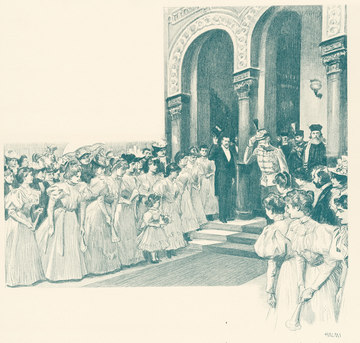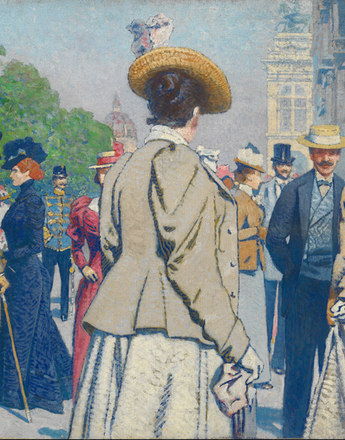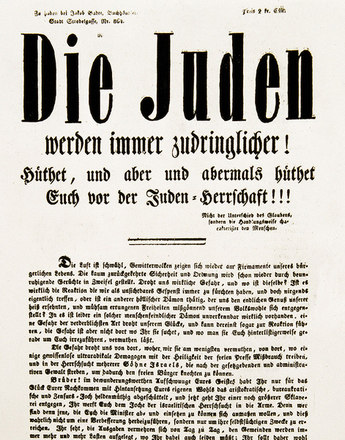The Habsburg Monarchy as the guarantee of pluralistic identities
-
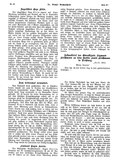
Hirschmann, Sigmund: “I am delighted at the conduct of the Jewish officers” field post letter printed in Dr. Bloch's Oesterreichische Wochenschrift, the central organ for the general interests of the Jews, Vienna, 18 December 1914, p. 877
Copyright: Universitätsbibliothek JCS Frankfurt am Main
Partner: Universitätsbibliothek Frankfurt am Main -
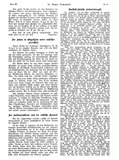
Hirschmann, Sigmund: “I am delighted at the conduct of the Jewish officers” field post letter printed in Dr. Bloch's Oesterreichische Wochenschrift, the central organ for the general interests of the Jews, Vienna, 18 December 1914, p. 878
Copyright: Universitätsbibliothek JCS Frankfurt am Main
Partner: Universitätsbibliothek Frankfurt am Main
For Austrian Jews, the Habsburg Monarchy as a supranational entity meant the possibility of developing an identity that was not based solely on membership of a national, ethnic or religious body. They saw themselves as the backbone of an integrative force loyal to the Imperial family within the multiethnic state, and advocated multinationalism up to the end of the war.
Most Austrian Jews were loyal to the Habsburg multiethnic state, identified themselves with German culture and were members of the Jewish faith. This membership, described by the historian Marsha L. Rozenblit as a "triple identity", had developed over the course of the second half of the 19th century, and had a unifying effect on the Jewish population of the multiethnic state. It felt itself patriotically linked to the monarchy and faithful to the Habsburgs.
In an age of increasing nationalism and the centrifugal effects of separatist movements, most Jews remained true to the state. The growing anti-Semitism and the ethnic definition of national identity increased their loyalty to the Habsburg Monarchy. Their expectation was that a strong central power would be most likely to allow autonomy rights to the individual groups while at the same time providing for equal rights for all citizens in the constitution. In addition, they saw the continued existence of the multinational Habsburg Empire as the best protection against rampant anti-Semitism.
At the beginning of the war, the majority of the Jewish population adopted a position of loyalty to the Emperor, and leading personalities gave vociferous expression to their patriotism. Many young men marched enthusiastically into war, and in particular those soldiers who had grown up under the threat of anti-Semitic agitation saw the war as an opportunity to vigorously prove their loyalty to the state and the Imperial house and to confute their detractors. Thus for instance, Egon Zweig wrote in the Jüdische Zeitung in July 1914: "The contemptible, who year in year out have vilified us Jews as heartless money machines, as dishonourable cowards, as the embodiment of all vices, who have trampled on our statutory rights to equal treatment with scorn, let them see how Jewish men, ready for battle, present to the Emperor what belongs to the Emperor."
Alongside the need to demonstrate their loyalty to the monarchy and to counter the allegations of cowardice and idleness, there was another reason for the large number of Jewish volunteers. For many, the war against Russia was seen as a crusade against the hereditary enemy of the Jews. The perception of the Tsarist empire as barbarian, despotic and anti-Semitic was reinforced in the first years of the war following the Russian army's invasion of Galicia, forcing thousands of refugees to flee to the Western part of the monarchy for fear of pogroms. Chronicles by Jewish soldiers from all areas of the monarchy testify that it was the war against Russia that justified their willingness to serve at the front.
Translation: David Wright
Beller, Steven: Wien und die Juden 1867–1938, Wien/Köln/Weimar 1993
Botz, Gerhard et al. (Hrsg.): Eine zerstörte Kultur. Jüdisches Leben und Antisemitismus in Wien seit dem 19. Jahrhundert, 2. Auflage, Wien 2002
Rozenblit, Marsha L.: Sustaining Austrian „National“ Identity in Crisis: The Dilemma of the Jews in Habsburg Austria, 1914−1919, in: Judson, Pieter M./Rozenblit, Marsha L.: Constructing Nationalities in East Central Europe, New York 2005, 178-191
Rozenblit, Marsha L.: Reconstructing a National Identity. The Jews of Habsburg Austria during World War I, Oxford 2001
Rechter, David: Kaisertreue. The Dynastic Loyality of Austrian Jewry, in: Hödl, Klaus (Hrsg.): Jüdische Identitäten. Einblicke in die Bewusstseinslandschaft des österreichischen Judentums, Innsbruck/Wien/München 2000, 189-208
Quotes:
„Die Nichtswürdigen, die jahraus, jahrein...“: Zweig, Egon: „Oesterreich und wir Juden“, Jüdische Zeitung. National-jüdisches Organ, Wien 31. Juli 1914, 31, 1
-
Chapters
- Antisemitism: A historical definition
- Jewish life in the Habsburg Empire
- Anti-liberalism – anti-capitalism – anti-Semitism
- Antisemitism as a political movement
- "I decide who is a Jew"
- The social exponents of Austrian anti-Semitism
- Anti-Semitism in other nationalities within the Habsburg Monarchy
- The Habsburg Monarchy as the guarantee of pluralistic identities
- Jewish soldiers in the Austro-Hungarian army
- The "Eastern Jews" as a pivotal point for anti-Jewish agitation
- The breakdown of the internal peace

